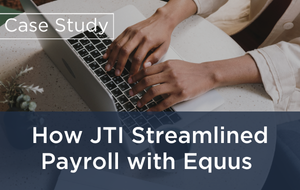Overview
Organizations use various tools to support the calculation of hypo tax deductions and tax gross-ups. There is no ‘right’ or ‘best’ solution – each has benefits and pitfalls. But what happens when organizations move to a new system or provider, and what do they need to consider ensuring a smooth transition?
The Challenge
Mobility teams have long strived to perform accurate and timely tax calculations for the moves they support. In this digital age, Tax Authorities around the world expect organizations to perform real-time, accurate tax calculations on global compensation which includes allowances, benefits in kind, and gross-ups. Coupled with the reality of Mobility teams being asked to deliver more whilst under headcount pressures, many organizations are turning to technology solutions to fill the ever-widening gap.
This case study explores the different aspects Mobility professionals need to consider as part of a transition to a new mobility tax engine, whether that be a new system or provider, and why careful timing of the switch can be critical to success.
The Status Quo
Payroll: Some mobility programs use their in-house local payroll to calculate both ‘stay-at-home’ hypo taxes and any applicable gross-up taxes. Retaining the calculations in-house ensures control and familiarity – hypo deductions typically align with the employee’s prior period actual deductions, minimizing questions to the Global Mobility team. With assignments being a time of upheaval and great change for employees, this continuity can be invaluable. However, challenges can arise when local expertise is domestic-focused, and turnaround times can understandably slip as payroll cut-off nears.
Expat Tax Firm Calculations: Other programs outsource tax calculations to their tax provider. Whilst the results are highly accurate, reliable, and bespoke to each employee, turnaround times can cause frustration, and this personalized approach can be costly.
Online Tax Calculators: Mobility vendors are another outsourcing option, as they are able to provide high quality, reliable services or online tools to compute and prepare balances sheets and cost estimates. Although calculations are consistent, visibility of the tax positions and approaches taken can be high level or incomplete.
No matter what source is used for the calculation of tax values, once the operating process is established into the day-to-day operations of a Global Mobility program, timely and accurate tax computations can be delivered to the employee and business stakeholders involved in any move. Understandably, there can be a reluctance to change – the adage of “if it ain’t broke, don’t fix it” can be difficult to shift!
But in these volatile and changing times, Mobility teams are commonly being asked to support evolving move types, policies, and ultimately more responsibilities. Delivery of high quality and timely solutions throughout the move lifecycle can be greatly aided by end-to-end mobility management technologies. The demand for such systems has never been greater – the operational benefits (workflow efficiencies and automation) are broad and tangible.
In spite of this, moving to a new Tax Calculation solution is often met with a fair degree of reluctance, trepidation and skepticism. Organizations understandably worry whether the new calculations will be compliant, and how to manage queries from employees and other business stakeholders trying to understand the new calculation methodology. As a result, it’s common for clients to aspire to integrate their existing tax calculation tool or process into the new technology.
The Solution
The Equus Mobile Workforce Platform delivers significant opportunities for organizations to transform their mobility operations by automating manual processes and transactions. Sitting at the heart of the Platform is the Equus Tax Engine, delivering accurate tax calculations for over 214 authorities (and counting) at the click of a button. Built and maintained by Equus’ in-house tax team of qualified tax professionals, the engine supports all types of tax policy, from hypothetical taxes for tax equalized policies to gross-up taxes for host-based and permanent moves, and everything in-between. Changes to employee compensation are immediately identified, with the associated taxes recomputed efficiently and effectively either on a case-by-case basis, or in batches to save even more time. The new computations are then seamlessly translated into payroll instructions.
How can I empower my team to answer questions relating to the new tax values? Full visibility of the entire tax calculation empowers Global Mobility users to confidently answer tax-related queries from employees and other stakeholders, covering tax exemptions to the marginal tax rate applied. In addition, your Global Mobility team have 24/7 access to online training courses and help content, as well as their dedicated Client Success team.
What if the change creates lots of “noise” from employees? With more than 17 years of experience helping organizations move over to our Tax Engine, the Equus team can effectively advise you on how best to make the switch to minimize noise and maximize a seamless adoption. We will partner with you to determine how best to make the switch for your organization, whether that be a big bang approach or piecemeal over time.
Is the Switch Mandatory? No, it most definitely is not! However, whilst external tax values can be brought into the Equus Platform, we recommend making the change at an appropriate time to suit your organization, fitting in with your policies and processes, to ensure you gain maximum return on your investment. Most clients prefer to switch over to using the Equus Tax Engine, as it delivers a fully integrated solution and huge operational process efficiencies – plus the opportunity for fee savings.
Is there an optimum time to make the change? The short answer is yes! During implementation, Equus will work with you to fully understand your tax policies and any tax positions you may apply for each home and host country tax system. This approach ensures consistency from one tax engine tool to another. Even so, no tax engine in the market will ever be identical – there may be modest variances from one system to another. Even these small variances can be enough to worry Global Mobility professionals about the level of questions and scrutiny that may arise from impacted employees. Carefully timing the switch to a new tax engine can greatly reduce this “noise”. Consider…
Carefully timing the switch to a new tax engine can greatly reduce this “noise”. Consider…
Alignment with the reward review cycle: If an employee’s base compensation changes in line with an annual review cycle, it’s expected that tax values for both income and social taxes will also change. Any variances resulting from the change in tax calculation engines can therefore be “absorbed” by the compensation increase.
Alignment with the market data review cycle: Updates to FX-rates, or market allowances such as COLA indexes will also impact the employee’s net package. Again, any variances in calculated tax deductions will be included within the changes resulting from the data updates.
New policy rollout: The introduction of a new policy with new allowances, benefits and/or associated tax policy is perhaps the most ideal time for change. If there is no urgency to move away from your prior tax calculation engine, you may wish to grandfather your old policies, continuing to use the old method until they repatriate, localize or terminate employment.
Alignment with the new tax year: It’s common for rate bands, allowance values and even marginal rates of tax to change, making the new tax year an ideal time to move across to a new tax engine. However, note that not all country tax years follow the calendar year, so the switch may need to follow in subsequent months for fiscal year countries.
Big bang: Sometimes events conspire in such a way that the only option is to move all assignments over to the new tax provider at once. Whilst this leaves less opportunity to get the business, GM team and employees comfortable with the change using a piecemeal approach, the switch can still be managed effectively, reducing noise and stress.
The Results
Continental is a great example of putting the big bang approach into practice. They had a deadline to move away from their data provider and planned to simply “swap” providers for all data types, including tax. However, with the Equus Tax Engine already included within their license fee, they soon realized the cost savings to be had and resolved to make the move.
Despite the lure of ongoing cost-savings, they still had concerns. Their team didn’t have any experience with the Equus Tax Engine – how would they be able to answer questions from assignees and the business? Were other clients using it? How was it kept up to date?
To address these fears, their dedicated Client Success team partnered with them through regular meetings and training sessions, bringing in their Equus Tax Lead for the more technical questions. Their Client Success Manager put them in touch with other clients who were already using the Equus Tax Engine, so they could ask questions and gain insights. Lastly, they were able to run “test” calculations, using their tax provider to compare calculations and determine the reason for and how to manage any variances.
In total, the wider project took around 6 months, of which the move to the Equus Tax Engine was a key part. Continental were able to meet the deadline to move away from their incumbent provider. In addition, they greatly reduced both their spend on data, and time spent on salary reviews by using the Platform’s batch functionality. Equus supported them through their first salary review process by scheduling regular calls to walk through queries together, teaching them tactics for effective troubleshooting. As the Equus Tax Engine is updated every 2 months with the latest tax rates, the need to manually update their tax data in the Platform each year was removed, freeing up resource for more value-add activities.
Read the full Continental Case Study.
“Prior to the change, the Continental Global Mobility team was typically using tax data that was one year old with very few ways to customize for modern family arrangements and special situations. Since we were changing data providers for cost of living, location, housing and travel data in large part without grandfathering, it was a unique opportunity to also change to the Equus Tax engine at the same time for all assignees. So with the trust of the experienced Equus tax team and our Equus account team, we went for it. It was noisy in certain pockets of employees, but overall manageable since the Global Mobility team communicated 2-3 months ahead of time that the change was coming to HR and the assignees.”
– Anna Potter, Head of GPS Global Mobility Services Americas Hub at Continental













